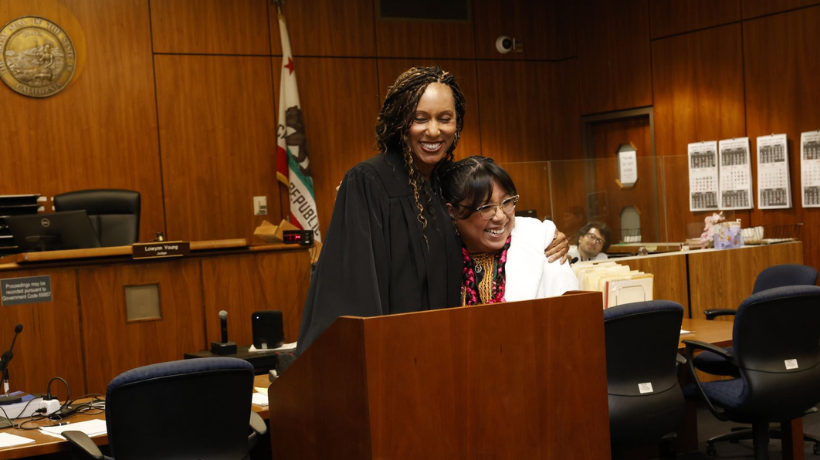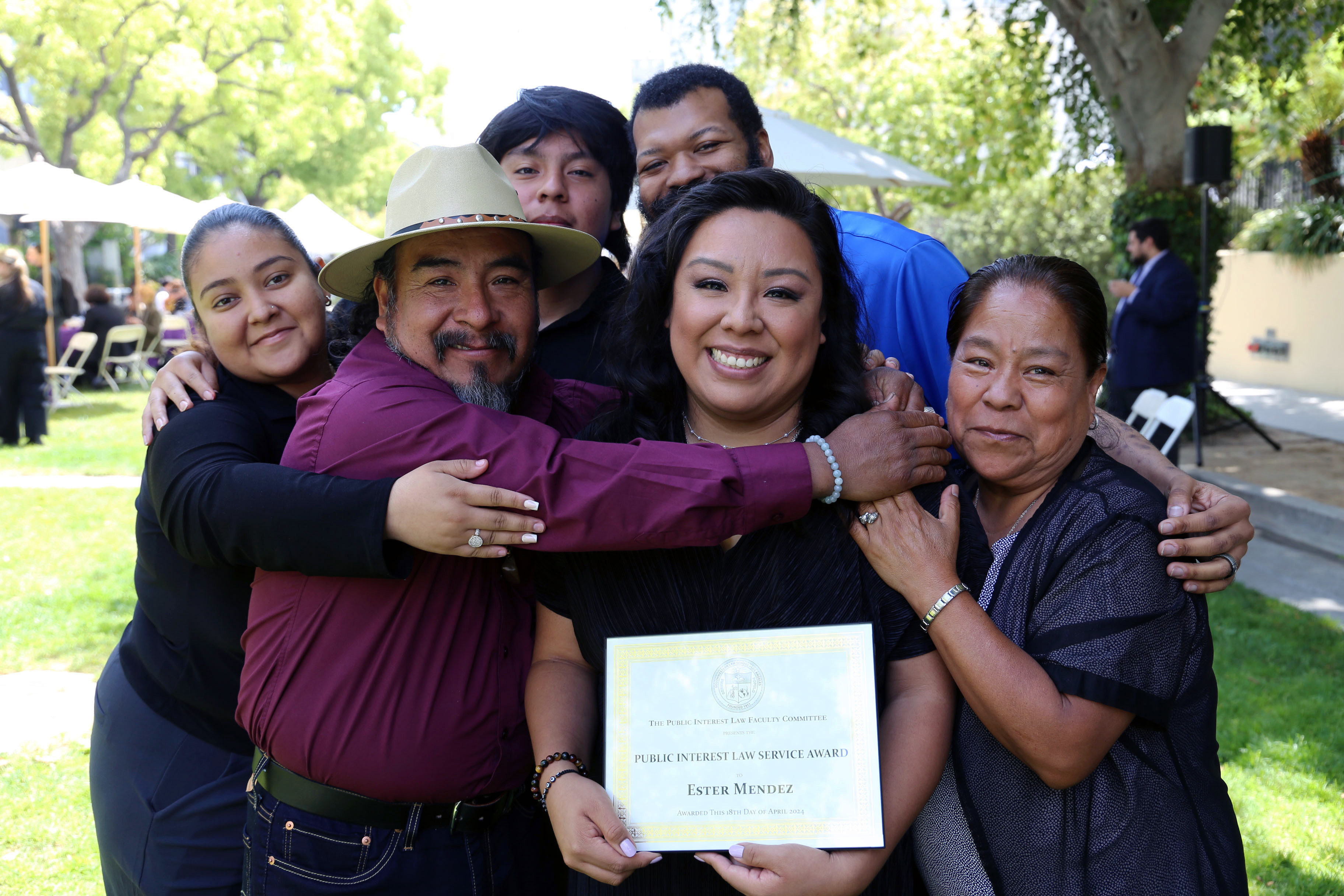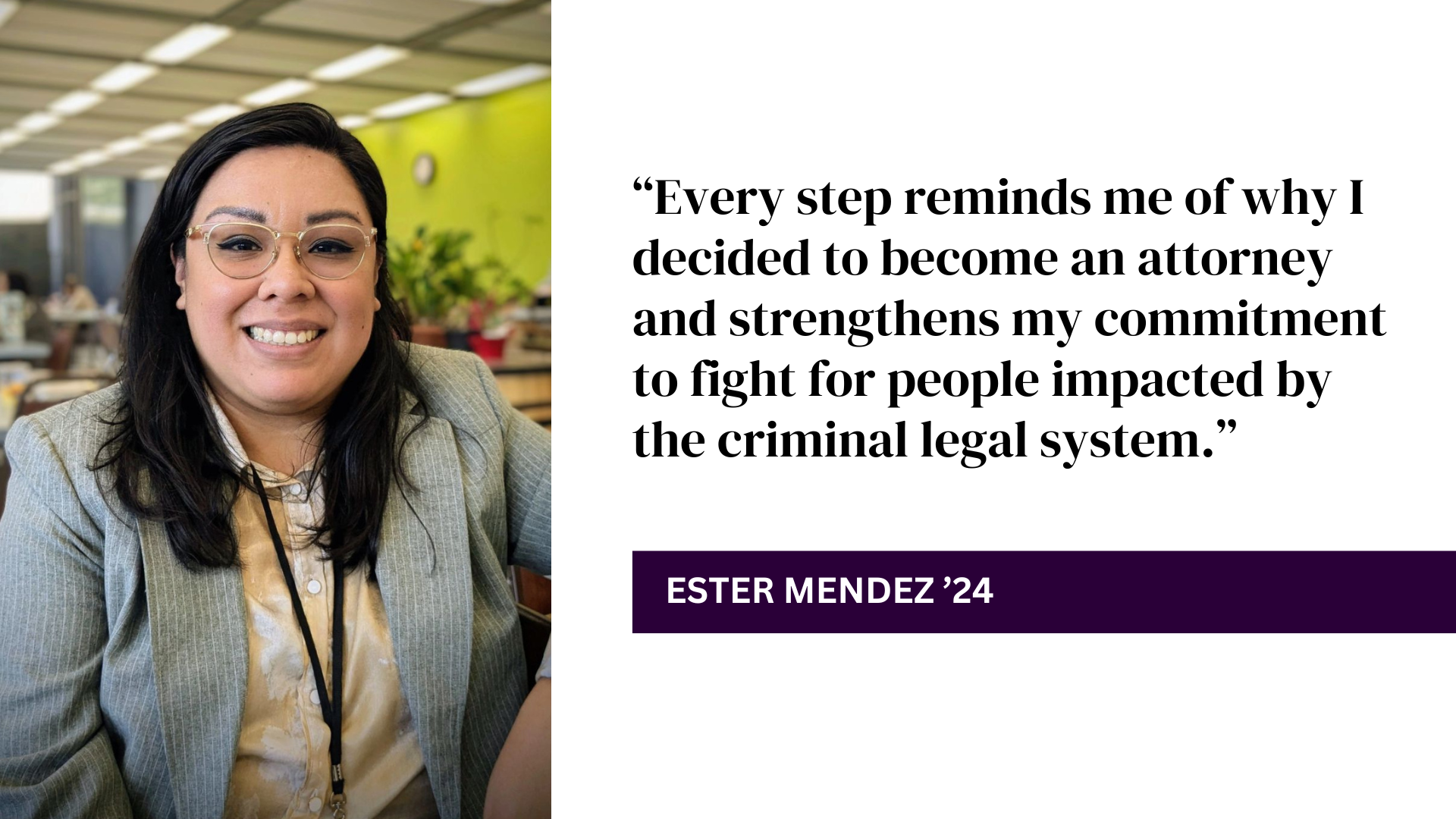SWLAW Blog

August 18, 2025
Defendant Turned Defender: How Ester Mendez ’24 Found Her Path to Advocacy
The first time Ester Mendez '24 appeared in a Los Angeles courtroom, she was wearing a jail-issued jumpsuit. Shackles bound her wrists, waist, and ankles. The next time, nearly a decade later, she walked into that same courtroom wearing a white suit. Her Zapotec braids were woven with ribbons—symbols of freedom, pride, and the years it took to return not as a defendant, but as an attorney.
“I stood there in my white suit, my beautiful Indigenous braids woven with ribbons resembling pride and resistance while being free, educated, and finally licensed to practice law,” she later wrote. “As soon as it ended, I wanted to relive it all over again.”
The judge who administered her oath that day was Hon. Songhai Armstead—the same judge who, years earlier, had offered her a chance to serve her sentence on house arrest while undergoing mental health treatment and starting community college.
“That opportunity… ultimately resulted in having a stable life as a practicing attorney,” Mendez wrote.

Today, Mendez is a deputy public defender for Los Angeles County. Her clients are often living on the margins—unhoused, struggling with addiction or mental illness, or caught in cycles of poverty that the legal system rarely accounts for. She sees them clearly, because she has lived many of their realities.
“I represent indigent people who are often in need of mental health assistance, housing, stability in their life, education, and so on,” she said. “So I work on their criminal case while connecting them to resources to receive help in these areas of their life.”
The moment her own trajectory changed came in 2016. Facing reincarceration, her attorney, Elliot Zarabi, advocated for her to remain in her treatment program. “He did everything he could so I would not serve any jail time,” she wrote. “Ultimately, I did not have to go back to jail.”
Before that, Mendez had cleaned houses to survive. “That instilled in me the values of hard work, humility, and dedication,” she said. But the job also revealed the ways people with power can exploit those without. She recalled being asked to perform unsafe tasks and witnessing how domestic workers were denied basic legal protections. It was a formative education in labor, dignity, and the quiet violence of inequality.
Her own time experiencing homelessness and incarceration exposed her to another harsh reality: how easy it is for people to disappear inside broken systems.
“Criminalizing poor people for engaging in survival human behavior is inhumane,” she wrote. “What we need are second/fair chances toward a different life path that will lead to our empowerment.”
That clarity came through hardship, but also through the people who saw her differently—who didn’t reduce her to her record, but offered help when she needed it most. “I did not get here alone,” she wrote. “Yes, getting here required a tremendous amount of footwork that came from within, but compassionate people who understood my needs fought for me and gave me a chance.”
When it came time to apply to law school, Mendez chose Southwestern. She lived in Koreatown and had met an alum who encouraged her. What struck her once she arrived was how many students and faculty were eager to build something more inclusive. She co-founded IMPACT, a student group for formerly incarcerated individuals, offering support for the moral character process and mentorship for youth interested in law.
She found affirmation in the classroom, too. Professor Vásquez’s Critical Race Theory course “provided a space for students to discuss real life experiences while connecting them to published articles by recognized scholarly writers and educators.” Professor Gunning, who served as IMPACT’s advisor, helped organize panels and welcomed impacted youth to tour the campus.
Mendez remembers how surreal it felt to return to court as an advocate. Some mornings, she said, she still can’t believe she’s the one in the suit—speaking for someone else who might not yet believe they’re worth fighting for. But that disbelief is short-lived.

“I recognize the power of reflection and vulnerability as a source of energy that I utilize to stay motivated for my clients at the Public Defender’s Office,” she said. “People want to know that you are giving it all you have because you care about them and their case—and they know that I do.”
She sees her work as personal. “When I address the court, I speak from my heart because I know what it’s like to be ignored, underestimated, and put down for your circumstances,” she said. “I use my personal life experience to listen carefully to figure out what the client needs and is asking for, as well as to determine the best approach for the client’s case and well-being.”
Outside the courtroom, Mendez continues to challenge stigma through visibility and storytelling. As a lawyer with invisible disabilities and a criminal record, she chose to speak publicly—on social media, on television—because, she says, too many people still don’t understand what people like her are capable of.
“There is too much negative stigma behind those with a criminal record and the disability community,” she said. “The truth is that we are highly valuable because we have the ability to have book smarts and street smarts—life experience—a quality not able to be acquired by reading a textbook.”
Her time with the Coelho Center and the Justice, Care and Opportunities Department (JCOD), now led by Judge Armstead, affirmed that identity. “I wasn’t aware of what I was capable of,” she said, “but after being exposed to these leaders, I began to count myself in more.”
What brings her the most joy, she says, are the moments of connection with her clients—when someone sees her not just as a lawyer, but as a person who truly understands.
“Clients have decided to be vulnerable with me while I give them the space and time to do it,” she said. “Many times this results in clients letting me know that they value me as a person and are overwhelmed with gratitude for having me as their public defender, especially after seeing me fight for them in court.”
If law schools want to support more students like her, Mendez says, they need more than good intentions—they need trauma-informed resources, advisors who understand the moral character process, and counselors trained in PTSD, recovery, and the unique pressures of navigating law school with a history of system involvement.
“Law school is a high-pressure, stressful environment,” she said. “That can be uniquely challenging for these students.”
Still, she returns every day to the courtroom, with clarity about what brought her there—and who she’s fighting for.
“Every step reminds me of why I decided to become an attorney,” she said, “and strengthens my commitment to fight for people impacted by the criminal legal system.”